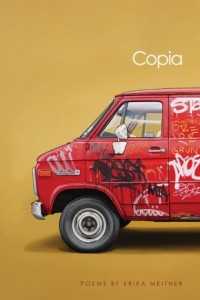 When I was in the Poetry Workshop last semester with Lytton Smith, we read two poetry collections with documentary or journalistic elements–one of which was Erika Meitner’s Copia. In her collection, Meitner intervweaves personal anecdotes about materialism, desire, and home with researched information on Detroit and, even, a verbatim interview with a Detorit automobile factory worker.
When I was in the Poetry Workshop last semester with Lytton Smith, we read two poetry collections with documentary or journalistic elements–one of which was Erika Meitner’s Copia. In her collection, Meitner intervweaves personal anecdotes about materialism, desire, and home with researched information on Detroit and, even, a verbatim interview with a Detorit automobile factory worker.
Recently, Lytton asked if I’d be interested in doing a documentary poetry reading and discussion at this year’s GREAT Day. All last semester, between taking Steve’s Lyric Essay class and Lytton’s Poetry workshop back-to-back, I was researching and writing about Sonyea’s Craig Colony for Epileptics for a directed study and a lot of what I was learning transferred over to both my essays and my poetry. And, sometimes, an essay would prompt a poem or a poem would help inform an essay. Because of this, I’ve realized how fluid the borders separating creative nonfiction and poetry really are (just look at a lyric essay or a prose poem and you’ll know what I mean).
In her collection, Meitner explores materialism by researching what goes on in Walmart parking lots across the country. From “Walmart Supercenter“:
In Port Charlotte, a woman’s body was found in a Jetta
in a Walmart Parking lot. In a Walmart parking lot in Springfield,
a macaque monkey named Charlie attacked an eight year-old girl.
I am a Walmart shopper, a tract-house dweller—the developments
you can see clearly from every highway in America that’s not jammed up
on farmland or pinned in by mountains.
And, from a bit later on:
A man carjacked
a woman in the parking lot of the West Mifflin Walmart, then ran
under a bridge and disappeared. Which is to say that the world
we expect to see looks hewn from wood, is maybe two lanes wide,
has readily identifiable produce, and the one we’ve got has jackknifed itself
on the side of the interstate and keeps skidding.
Meitner also uses a verbatim interview poem in the third section of her collection, which focues on Detroit. From “All That Blue Fire“:
I went to the Ford Motor Company
because they were hiring. That was
the 3rd of January, 1969.
My first job was working in the engine plant,
where they build the motors at.
I just came up here to a New Year’s party
and got this job and never go back.
With all the different types of CNF we’ve studied so far this semester, I’m wondering how a collection like Copia might fit into what we’ve been discussing. In regards to writers like Didion, Wolfe, and Thompson, we see how the personal intersects with the factual–Didion forms relationships with the people she observes, Wolfe actively follows his subject around, and Thompson becomes the protagonist of his own research. In Copia, Meitner presents a two-fold exploration of her own life alongside factual information on the decomposition of Detroit and America’s materialistic culture. In class, we’ve also studied nontraditional forms of CNF–Sherman’s March and Serial. In the critical article we read, McElwee even calls his movie a form of an essay. Which makes me wonder: what if the term essay is not limited to the form a fact-based story is structured as but, rather, a way to approach or document a subject? Could documentary poetry be another nontraditional form of CNF?